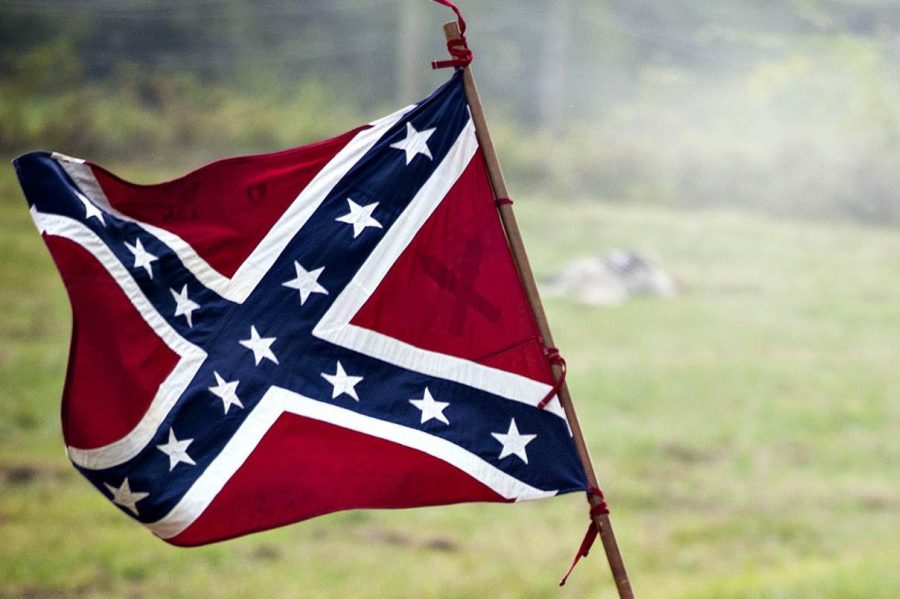The Confederate Flag: Does It Represent Heritage or Hate?
The confederate battle flag’s meaning has evolved throughout the years.
As of May, Saucon Valley High School is being sued following allegations that the school has not appropriately addressed cases in which students are harassed because of their race. These instances have been recorded for years in isolated instances at the school, but recently have escalated enough for a lawsuit. One of these incidents that occurred three years ago involved a group of students throwing a Confederate battle flag at an African-American student, and telling him to “wear it with pride,” according to the Morning Call.
What did those students mean when they said to wear the Confederate battle flag with pride? This question ultimately goes back to a decades-old debate: is the Confederate battle flag offensive? In order to answer these questions, you must go all the way back to the Civil War, the time during which the flag was designed.
“I think [the Confederate battle flag’s] original meaning was that this section of the U.S. wanted to become their own country and [the flag] represented reaching for independence in [the confederacy’s] mind and what they thought was right,” junior Taso Rubino said.
Preceding the secession of the South in 1861, Abraham Lincoln of the Republican party was elected President of the United States. According to Khan Academy, the Republican party was strongly anti-slavery. The South was enraged by President Lincoln’s election, thinking that they would be forced to give up slavery. Without slavery, many of the rich Southerners believed they would not be able to support themselves.
According to the “Encyclopedia Virginia,” after the Confederacy seceded from the United States, their leaders decided that they would need a flag different from the American one. The Confederate battle flag, however, was never officially adopted as a national flag. It was used during battle to help soldiers identify their side. Because it was associated with the soldiers fighting against the Union, the flag became a prominent symbol, and eventually became more popular than the official flag of the Confederacy.
“I think that [the Confederate battle flag] was once used by some people to truly advocate for states’ rights and advocate for a Confederacy, but right now I really think that people use [the Confederate battle flag] as a mask for racism,” senior Emma Duane said. “I personally believe the Confederate flag is a sign of inequality and a sign of injustices that some humans still face today.”
Now, the flag may not have been the official flag of the Confederacy, but the it was still associated with it. The flag was widely used by Confederate soldiers, and after all these generations, it is still used to represent the cause of the Confederacy: slavery. Rich members of the South feared losing all the money and prosperity they had accumulated thanks to cheap slave labor, so this is what the South was really fighting for.
The flag did not disappear into history after the Civil War. Instead, it has continued to represent new causes and take on new meanings. During a July 2017 Ku Klux Klan rally in Charlottesville, Virginia, called “Unite the Right,” many people were seen waving the Confederate flag alongside the Nazi flag.
“I don’t like [the Confederate battle flag]. I don’t agree with what [the flag] stands for, but I’m not going to bash it in any way, shape, or form,” sophomore Kate Miller said.
According to a 2007 paper published by “The American Journal”, the Ku Klux Klan joined with the American Nazi Party in the 1970s. This is significant because the Ku Klux Klan had long used the Confederate flag to represent their cause of white supremacy, but when they began working with the Nazi party, they started to incorporate the Nazi flag into their rallies.
From representing Robert E. Lee’s army during the Civil War, becoming a symbol of heritage for veterans of the Civil War in the South, and symbolizing the causes of the Ku Klux Klan and the American Nazi Party, the meaning of the Confederate battle flag has evolved quite a bit. This evolution begs the question posed at the beginning of this article: is the Confederate battle flag offensive? Opinions may vary, but the facts can help you decide where you stand on the issue.

Senior Sarah Jacobson is a third-year staff reporter, former Our World editor, and current Editor-in-Chief of the Spotlight. She is also the head of social...


